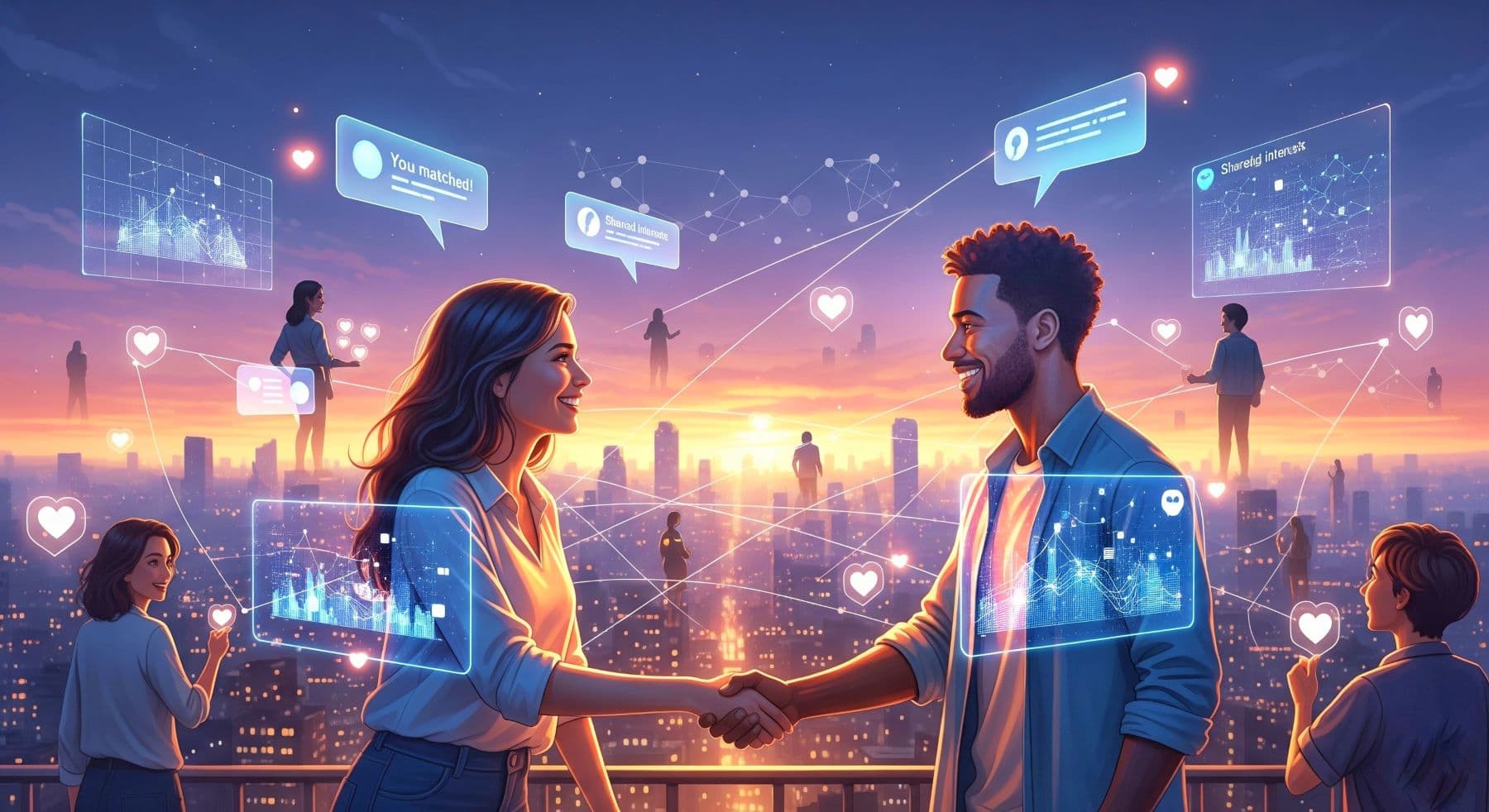How AI Is Helping People Find Love — Meaningful or Mechanical?
Published on 8 August 2025

1. Introduction: Love in the Age of Algorithms
For generations, finding love was about chance — a shared glance on a subway, a serendipitous conversation at a friend’s party, or a blind date set up by someone who “just knows.” But over the last decade, the pursuit of love has shifted online. Dating apps like Tinder, Bumble, Hinge, and Coffee Meets Bagel now play the role of modern cupids.
Yet, as many users will admit, endless swiping doesn’t always lead to a meaningful connection.
Enter artificial intelligence (AI) — not to replace romance but to refine it. AI is transforming modern matchmaking by:
- Improving compatibility algorithms
- Offering coaching tools for self-reflection and communication
- Facilitating real-world introductions based on deeper insights
But is this shift helping us forge more genuine connections — or are we outsourcing intimacy to machines?
2. Real Stories: When AI Helped Love Happen
A Different Kind of Matchmaker
Sophie, a graphic designer in London, had grown weary of stereotyped conversations and mismatched connections. On a new app that used AI to assess communication styles and priorities, she was paired with Jordan — a soft-spoken software engineer who, at first glance, didn’t fit her typical “type.” But their rapport was immediate. Their chats felt authentic, and their interests aligned unexpectedly well. Six months on, they remain in a committed relationship and are planning a vacation to Italy — a story where AI helped two people find meaningful compatibility over superficiality.
ChatGPT as a Dating Coach
Across the Atlantic, Erin Spencer relied on ChatGPT not to date, but to introspect. After a string of unsatisfying matches, she asked the AI to help her define her relationship values and reframe her dating profile. The clarity that emerged reshaped her online presence and led to more intentional conversations. Eventually, Erin met someone who shared her goals — and real connection followed.
Alexander’s Engineered Engagement
In a compelling example, Alexander Zhadan from Moscow used ChatGPT strategically to manage thousands of Tinder matches. He programmed it to filter profiles and craft messages, transforming his digital outreach with automation. This led to a real-life connection with Karina Vyalshakaeva, whom he proposed to and is now set to marry — thanks, in part, to algorithmic assistance
.
Refining Conversations with Professional Guidance
Dating app fatigue is real. That’s why apps like Rizz have gained steam — blending AI and human coaching to assist with messaging. A U.S.-based user reported that Rizz structured their responses on chat platforms and helped them decide when to advance or move on. Though not a direct love story, it illustrates how AI gently guides effortless conversation—nurturing romance rather than dictating it.
University Matchmaking Reimagined
The Aphrodite Project, active on campuses across North America and Asia, combines psychological profiling and machine learning to match students. Participants answer in-depth questions about values and emotional preferences. Since its inception, the project has resulted in several campus romances and even marriages. It’s a reminder that thoughtful, data-informed pairing can recreate organic connections even amid digital noise.
AI Meets Live Social Venues
Stitched Social blends algorithmic matching with in-person social events in major cities. Attendees meet in curated settings — like book cafes or wine meetups — after AI suggests compatible pairings. In some pilot events, nearly 50% of attendees requested second dates — almost triple the average on swipe-based apps.
Real Results from Hybrid Matchmaking
Sitch adds another layer of sophistication. This app uses a hybrid model, pairing AI-generated matches with human review. Participants complete detailed profiles and get limited, curated introductions each week. Many report that the human oversight keeps the experience genuine and grounded, even as AI does the heavy lifting in matchmaking.
3. How AI Is Reshaping Modern Matchmaking
Smarter Dating Apps
AI is now deeply embedded in popular dating platforms:
- Hinge uses machine learning to identify which types of profiles users are likely to engage with — and uses that to improve recommendations.
- Bumble offers conversation prompts and nudges, especially for users who get stuck after matching.
- eHarmony applies personality-based matchmaking using decades of behavioral data.
The result? Better conversations, fewer mismatches, and more intentional dating.
The Rise of AI-Assisted Events
Some startups are merging real-world events with AI insights. Participants fill out detailed questionnaires, and AI helps pair attendees at speed dating or social mixers. The AI doesn’t just look at interests — it evaluates communication style, emotional openness, and shared values.
This hybrid model (digital + physical) is helping people meet others they’re more likely to connect with in real life — without wasting time.
4. Why AI-Powered Dating Feels Heartwarming
1. AI Boosts Confidence
For people who are shy, introverted, or returning to dating after a breakup, AI-based tools can offer subtle but powerful support. Some platforms offer profile optimization suggestions, while others provide coaching prompts for initiating or continuing conversations.
These tools don’t fake personality — they help reveal it more clearly. And that can be life-changing for someone nervous about re-entering the dating pool.
2. Encourages Deeper Conversations
Unlike swipe culture, which often prioritizes looks or clever one-liners, AI can encourage slower, more thoughtful connections. Some platforms limit daily matches, encouraging users to invest time in getting to know one another.
That shift from volume to depth leads to richer conversations, fewer ghostings, and higher emotional engagement.
3. Enhances Long-Term Compatibility
AI systems now analyze more than just shared hobbies. They look at emotional patterns, conflict resolution styles, and even life timelines (e.g., who wants kids, who values independence). This enables matches with long-term potential, not just short-term chemistry.
5. When AI Becomes Problematic
1. The “Perfect Match” Trap
AI can sometimes be too good — creating a false sense of perfection. Users may come to expect flawless communication or idealized compatibility. But real love is messy, unpredictable, and human.
Imagine showing up for a date only to realize the charming banter was generated by a chatbot. That kind of disappointment can shatter trust.
2. Emotional Laziness
Dating is a skill — it requires vulnerability, self-awareness, and active listening. Overreliance on AI can dull those skills. When AI writes your messages, curates your dating journey, or even offers advice during arguments, it’s easy to stop doing the emotional labor required in relationships.
AI should be a tool, not a crutch.
3. Bias and Data Privacy
AI systems are only as fair as the data they’re trained on. If a dating app learns from biased user behavior, it may unconsciously reinforce social prejudices — related to race, religion, orientation, or other sensitive attributes.
Privacy is another concern. Many apps collect deeply personal data: location, conversations, preferences, even voice data in some cases. Users must demand transparency, data control, and ethical AI practices from these platforms.
6. What’s Next: The Future of AI in Relationships
As AI continues to evolve, expect it to play a larger role not just in matchmaking — but in relationship maintenance.
Emerging possibilities include:
- Date planning assistants that recommend shared experiences based on mutual interests
- Conflict analysis tools that detect communication breakdowns and suggest better phrasing
- Emotional tone analyzers that help partners understand each other’s moods in texts or emails
- AI-based family compatibility tools, especially useful in cultures where family plays a strong role in relationship decisions
But the key lies in balance. No matter how sophisticated AI becomes, it can’t replicate chemistry, intuition, or shared silence.
7. Conclusion: Love With a Little Help from AI
AI isn't trying to steal your heart — it's trying to help you find someone who truly fits it. Whether it's helping you write a better profile, surface deeper compatibility, or navigate awkward first messages, AI can be a useful ally.
When used mindfully, AI doesn’t replace human connection — it strengthens it.
In today’s fast-moving, tech-saturated world, we often struggle to slow down and connect. AI may just give us the tools to do that better — if we let it.
So, is this future of love meaningful or mechanical?
It’s up to us. If we use AI with intention and heart, it doesn’t dull romance — it sharpens our understanding of it.
Frequently Asked Questions
How do AI dating apps actually work?
Ans : AI dating apps use machine learning to analyze user behavior, preferences, and data points from your profile. They go beyond simple swipes to match you based on deeper compatibility, communication styles, and even long-term relationship goals.
Can AI write my dating profile for me?
Ans : Yes, many AI tools and apps like Rizz can help you write a more engaging profile, suggest witty conversation starters, or even rephrase your messages. The goal is to help you present your authentic self more effectively.
Are AI-powered dating events real?
Ans : Yes, startups like Stitched Social and projects like The Aphrodite Project use AI to match participants and then bring them together for in-person events. The aim is to increase the chances of genuine connections by curating compatible pairings beforehand.
Is it safe to use AI for dating?
Ans : While AI can enhance dating, there are risks. Over-relying on it can lead to inauthentic interactions. It also raises concerns about data privacy and potential algorithmic bias. It is important to use these tools mindfully and with a clear understanding of their limitations.
What is the future of AI in relationships?
Ans : Beyond matchmaking, AI is expected to assist with relationship maintenance. This could include tools for date planning, conflict analysis, or even helping partners better understand each other's communication styles in texts and emails.



